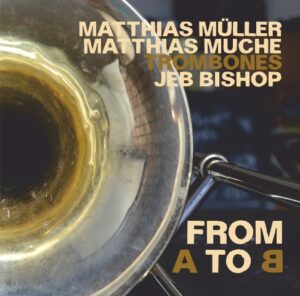CD jw 228 JEB BISHOP / MATTHIAS MÜLLER / MATTHIAS MUCHE
FROM A TO B
JEB BISHOP / MATTHIAS MÜLLER / MATTHIAS MUCHE trombones
EN
CELEBRATE THE TROMBONE
Celebrate the trombone. Appreciate its slipperiness and weight; how it amplifies the intimacy of the voice and becomes vocal itself. Admire its ability to saturate and cut. Applaud its softening of the distance between nearly indistinguishable lows and all-too-present highs. The trombone is an object of comfort and warmth, an instrument of war, a field for play, and a surface on which to map revolutionary sound.
But the trombone, for all of its grace and gifts, is often found hiding amongst the more obvious—more needy—instruments. In the orchestra it plays the role of bass trumpet/soprano tuba, and its place in the hero-personality-obsessed history of jazz is no less frustrating. There is no universal cultural persona for the trombone: no iconic JJ Johnson image for t-shirts and dorm room posters; no blithely dropping Jack Teagarden into polite dinner party conversation.
And this lack of attention, this running-amongst-tall-trees narrative, is the trombone’s blessing. It’s liberated from the crushing weight of tradition. It has no dominant idol to demand deference or allegiance. With less pressure to live up to a historical ideal, the trombone is free to be sung with any voice, amplifying and mimicking speech and song without relying on artifice. It is the augmentation of all that is organically human, and its song can be a scream, a sigh, a hum, a whisper, and a shout all at the same time. Very few instruments can match the trombone for its raw intimacy, and I envy the trombonist this connection to honest and natural expression.
I was committed to the trombone when, in third grade, I got to pick an instrument for band class. At that point, the possibility of thwacking the person in front of me with the slide was its main selling point, but deep down, I was already drawn to some special quality in the slide and the flare of the brass bell. I was in the early gestation period of what I wanted to do, and the trombone, without me knowing it, was pulling me toward the most efficient path. I was gently steered away by the person demonstrating the horns—a subterfuge I’m sure my saxophonist father had initiated. Instead, I spent 40 years wrestling an instrument with multiple and deep generational layers of sedimental tradition to be more like its brass family sibling. A minor, but meaningful, opportunity lost.
And maybe it’s this early love of the trombone and this feeling that I’ve missed my path that allows for the somewhat odd proposition of a trumpet player writing liner notes for a recording of three trombonists. My love for these musicians mirrors my—very clear by now—love of the instrument. And if I was more conscientious about the common forms of promotional writing, this is where I’d be giving sermons on the music of Jeb Bishop, Matthias Muche, and Matthias Müller as a way of proving their worth to the listener. But, to me, their value is already secured as an extension of the fact that they play the trombone—they are special people playing a special instrument—and I’ve been talking about them this whole time. Celebrate the trombone.
The TRIO is that celebration: a celebration of the sound and possibilities of the instrument. And this is a glorious document of the kind of people that understand what the trombone is: absorbing and shocking; technical and transcendent; radical and human. Nate Wooley
DE
FEIERN SIE DIE POSAUNE
Das Posaunen-Trio mit Jeb Bishop, Matthias Müller und Matthias Muche spielt Musik zwischen klangbildhauerischen Noise-Drones, Jericho einstürzenden Blechbläserkaskaden und zarten Klanggeflechten aus Luft und Ton, in denen die Posaune mit ihren physikalisch akustischen Eigenschaften und der Körperlichkeit der Spieler an ihre Grenzen und darüber hinaus beflügelt werden soll; immer weiter angetrieben wird der archaische Klangapparat durch die Knochenmühle gedreht…pulverisiert, sublimiert und wieder neu Atem eingehaucht.
Feiern Sie die Posaune.
Das TRIO ist diese Feier: eine Feier des Klangs und der Möglichkeiten des Instruments. Und dies ist ein glorreiches Dokument der Art von Menschen, die verstehen, was die Posaune ist: fesselnd und schockierend; technisch und transzendent; radikal und menschlich. Nate Wooley

